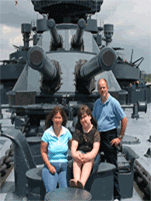Air pressure threads?
31 posts
• Page 2 of 3 • 1, 2, 3
Ok - I'm At the other end of the spectrum - I have TSC 12 " tires and I run about 50 lbs in them and have no problems and my rigs is about 1000 lbs. They say that they can be inflated to 90 psi - to achieve the rating on the tire - however - I get a little squeamish about inflating to 90 psi - But 50 is a good middle. As noted above there is difference in trailer tires and automotive tires - mostly being in the sidewall.
-

starleen2 - 5th Teardrop Club
- Posts: 16272
- Images: 224
- Joined: Sat May 12, 2007 8:26 pm
- Location: Pea Ridge ,AR
clarkbre wrote:If I'm reading your question correctly, you want to know if running a certain tire pressure will do something good or bad for the trailer...Absolutely!
The way your finished, loaded trailer rides is directly effected by what tire pressure you're running. Running a very low air pressure will make the trailer more likely to wiggle and sway behind the tow vehicle. It will seem very bouncy and squishy and wear the tires on the outer edges. If a high PSI is used, the trailer will ride very harsh. Hitting bumps will make the trailer want to jump. The tires will also be over inflated and wear in the middle.
For even wear and a pleasant ride, there is an optimum PSI.
If you know the weight of your trailer loaded and ready, you're half way there. Take your trailer for example: GTW 1000. If balanced correctly, the tongue should have a weight of 100# and each tire should share the rest of the load at 450# each.
Lets say your trailer has 4.80-12 tires rated at a max load of 750# at 60psi. If you take your trailer weight knowing that only 450# is going to be riding on each tire, it's just a simple math formula.
Take your load per tire (450#), multiplied by the max PSI of the tire (60), divide that by the max load of the tire (750), and you get what should be your correct PSI for maximum ride and wear quality.
450x60= 27000/750= 36PSI
So, in this case, your trailer will perform best with a tire pressure right around 36PSI.
This formula can be applied for any tire as long as you know the max weight, PSI, and the actual weight it will be carrying.
Hope this helps.
This formula yields 11 psi for my rig. Youbetcha, I'm willing to try it, but will carefully observe for the first 50-100 miles till I get confident with such low pressures. (I've been running 28 with OK results.)
Admittedly, my 2000lb axle is too stiff for my 850 lb teardrop (90lbs tongue). Tires have 1750 rating at 50 max psi.
The RoadCamper the old teardrop
-

Scooter - 500 Club
- Posts: 687
- Images: 69
- Joined: Sun Jun 13, 2004 3:56 pm
- Location: AZ

